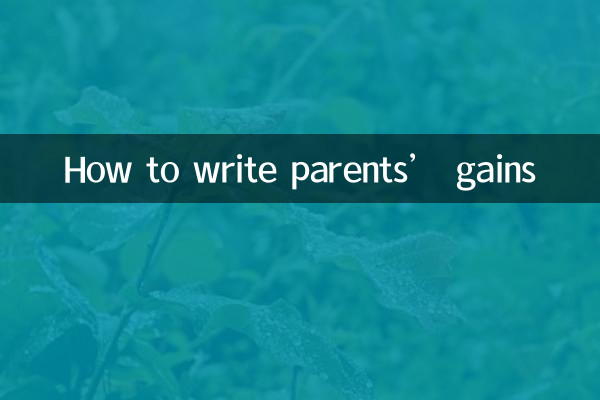What parents gain: Educational inspiration from recent hot topics
In the era of information explosion, how can parents extract valuable educational enlightenment from massive hot spots? This article combs through the hot topics on the Internet in the past 10 days, and uses structured data analysis to help parents avoid detours on the road to parenting.
1. Overview of recent hot topic data

| Ranking | Topic Category | Specific content | heat index |
|---|---|---|---|
| 1 | education policy | The first high school entrance examination reform after the implementation of the new curriculum standards | 9.2 |
| 2 | youth health | Summer myopia prevention and control guidelines released | 8.7 |
| 3 | family education | Expert discussion on the "e-parenting" phenomenon | 8.5 |
| 4 | campus safety | Special action on anti-drowning safety education | 8.3 |
| 5 | Science and technology education | Controversy over the use of AI tools in homework tutoring | 7.9 |
2. In-depth analysis of hot content
1. Enlightenment from the new curriculum standards and high school entrance examination reform
Data released by the Ministry of Education shows that after the implementation of the new curriculum standards, the proportion of practical questions in the first high school entrance examination increased to 35%. This reminds parents to focus on cultivating their children's ability to solve practical problems rather than simply memorizing knowledge.
2. New trends in myopia prevention and control among adolescents
The "Summer Myopia Prevention and Control Guidelines" issued by the National Health Commission states that 2 hours of outdoor activities a day can reduce the risk of myopia by 45%. Parents should arrange their vacation time reasonably to avoid excessive use of electronic devices by their children.
3. The dangers of the "e-parenting" phenomenon
Research by psychology experts shows that over-reliance on electronic devices to take care of children will lead to a 22% lag in the development of social skills in children aged 3-6. It is recommended that parents ensure at least one hour of high-quality parent-child interaction every day.
3. Specific actions parents can take
| field | specific actions | expected effect |
|---|---|---|
| learning ability | Complete 1 life practice project every week | Improve knowledge application capabilities |
| health management | Establish a "20-20-20" eye rule | Relieve visual fatigue |
| parent-child relationship | Set a "no electronics" period | Improve the quality of family communication |
| Safety education | Conduct safety drills once a month | Enhance self-protection awareness |
4. Suggestions for long-term education planning
1. Establish a dynamic adjustment mechanism
Assess your child's growth every 3 months and adjust your education methods according to changes. Data show that family education satisfaction is 23% higher among those who are regularly evaluated.
2. Make good use of technology but don’t rely on it
It is recommended that the use time of AI learning tools be controlled within 30 minutes a day. Excessive use will lead to an 18% decrease in independent thinking ability.
3. Develop lifelong learning habits
It’s important for parents to lead by example. The survey shows that in families where parents maintain study habits, children are 2.4 times more willing to learn independently.
5. Summary and call to action
It can be seen from recent hot spots that modern education is shifting from knowledge instillation to ability cultivation. Parents are advised to:
1. Set aside a fixed time every week to learn about education trends
2. Establish family growth files to record key data
3. Participate in parent learning activities organized by the school
Education is a marathon not a sprint. Only by continuously absorbing the latest information and constantly adjusting educational strategies can we help children grow healthily in a rapidly changing world.

check the details

check the details